
Marmalade is a fruit preserve made from the juice and peel of citrus fruits boiled with sugar and water. The well-known version is made from bitter orange. It is also made from lemons, limes, grapefruits, mandarins, sweet oranges, bergamots, and other citrus fruits, or a combination. Citrus is the most typical choice of fruit for marmalade, though historically the term has often been used for non-citrus preserves.

The J.M. Smucker Company, also known as Smuckers, is an American manufacturer of food and beverage products. Headquartered in Orrville, Ohio, the company was founded in 1897 as a maker of apple butter. J.M. Smucker currently has three major business units: consumer foods, pet foods, and coffee. Its flagship brand, Smucker's, produces fruit preserves, peanut butter, syrups, frozen crustless sandwiches, and ice cream toppings.

Histon Football Club is a football club based in the village of Histon, Cambridgeshire, England. The club are currently members of the United Counties League Premier Division South and play at Bridge Road in Impington. Nicknamed 'the Stutes', originating from the club's previous name Histon Institute, Histon's crest features a rose, the flower representing the rose-covered field given to the people of Histon & Impington in perpetuity for sporting activities in the community by local firm Chivers and Sons.
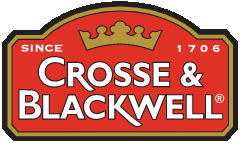
Crosse & Blackwell is an English food brand. The original company was established in London in 1706, then was acquired by Edmund Crosse and Thomas Blackwell in 1830. It became independent until it was acquired by Swiss conglomerate Nestlé in 1960.

Henry Jones IXL was a company primarily known as a manufacturer of jams, conserves and sauces in Australia. The brand was owned and its products manufactured by SPC Ardmona from 2004, which was itself owned by Coca-Cola Amatil from February 2005.
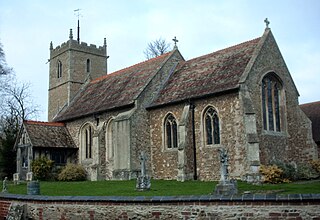
Impington is a village and civil parish about 3 miles north of Cambridge city centre, in the South Cambridgeshire district, in the county of Cambridgeshire, England. It forms part of the Cambridge built-up area. In 2011 the parish had a population of 4,060. The parish borders Girton, Histon, Landbeach, Milton and Orchard Park. Impington shares a parish council with Histon called "Histon & Impington Parish Council".

Premier Foods plc is a British food manufacturer headquartered in St Albans, Hertfordshire. The group owns many well-known brands, including Mr Kipling, Ambrosia, Bird's Custard, Angel Delight, Homepride cooking sauces, Lyons, Sharwood's, Loyd Grossman sauces, Oxo, Bisto, Batchelors and Plantastic. Premier Foods also produce cakes under the Cadbury's name, using the brand under licence. It is listed on the London Stock Exchange and is a constituent of the FTSE 250 Index.
Histon is a village and civil parish in the South Cambridgeshire district, in the county of Cambridgeshire, England. It is immediately north of Cambridge – and is separated from the city – by the A14 road which runs east–west. In 2011, the parish had a population of 4,655. Histon forms part of the Cambridge built-up area.
Robertson's is a British brand of marmalades and fruit preserves that was founded by James Robertson in 1864. The firm was run as a partnership until 1903, when it was incorporated as a limited company – James Robertson & Sons, Preserve Manufacturers, Limited. It produces the "Golden Shred" marmalade, a recipe created in 1874 and registered as a trademark in 1886, among other products including "Silver Shred" a lemon marmalade launched in 1909; "Mincemeat", a traditional Scottish style mincemeat made from raisins, peel, sugar and beef suet; and "Bramble Jelly", a traditional Scottish style jam, strained of its seeds. Robertson's received their first Royal Warrant from King George V in 1933.

Baxters Food Group Limited, also known as Baxters of Speyside or Baxters, is a food processing company, based in Fochabers, Scotland. It produces foods such as canned soups, canned meat products, sour pickles, sauces, vinegars, antipasto, chutneys, fruit preserves and salad and meat condiments.
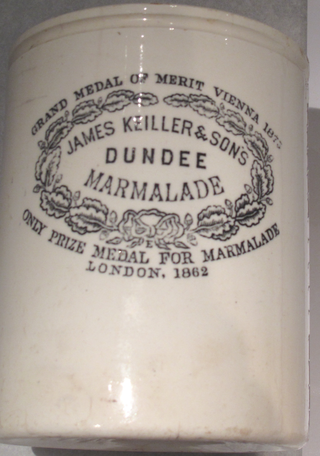
Keiller's marmalade is a Scottish marmalade, believed to have been the first commercial brand made in Great Britain. It was first manufactured by James Keiller in Dundee, Scotland, later creating James Keiller & Son, a brand name which became iconic in the 18th and 19th centuries, and has been sold several times.
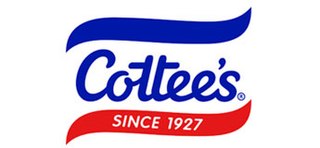
Cottee's is an Australian food and beverage brand founded in 1927. Cottee's make a variety of products including cordial, jams, marmalades and other spreads, toppings, jellies and puddings. The company is owned by Kraft Heinz with its drinks manufactured under licence by Asahi Breweries.
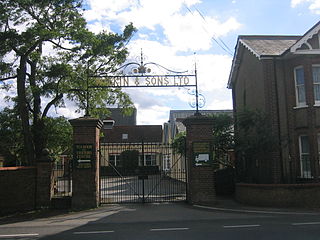
Wilkin & Sons Limited is a manufacturer of preserves, marmalades and associated products established in Tiptree, Essex, England in 1885, and known for its "Tiptree" brand of fruit preserves.

Fruit preserves are preparations of fruits whose main preserving agent is sugar and sometimes acid, often stored in glass jars and used as a condiment or spread.

Hartley's is a brand of marmalades, jams and jellies, originally from the United Kingdom, which is manufactured at Histon, Cambridgeshire. The brand was formerly owned by Premier Foods, until it was sold along with the factory in Histon to Hain Celestial for £200 million in October 2012. Hartley's operates as a brand of Hain Celestial's subsidiary of the United Kingdom, Hain Daniels.

Gale's is a Ubrand of honey, currently owned by Premier Foods. The former company had been established in 1919, remaining independent until it was acquired by Rowntree Mackintosh Confectionery in 1986.
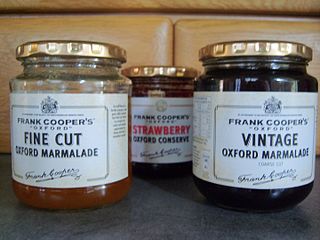
Frank Cooper's is a UK brand of marmalades and jams owned by Hain Daniels. Frank Cooper's is known primarily for its "Oxford" Marmalade and holds a Royal Warrant. The brand was created by Sarah Cooper in 1874 and as of 2012 is a brand of Hain Celestial Group.
Polaner is an American brand of fruit preserves and condiments that was founded by Max and Lena Polaner as M. Polaner Inc. in the late 19th century in Newark, New Jersey. It was renamed M. Polaner and Son, Inc. when their son Sidney Polaner joined the company.
Rose's is a brand of marmalade made by Hain Celestial Group. It is a popular product in the UK on buttered toast for breakfast.
Shirriff is the brand name of several food products first produced by the defunct Shirriff family food products company in Toronto, Ontario, Canada.















